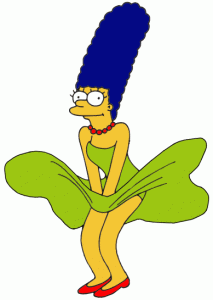The Simpsons celebrates twenty seasons of satirical splendor tomorrow.
I’ll be tuned in.
Yet when it all started, more than twenty years ago, I had no time for television. I was working thirty hours a week at a newspaper in addition to taking college courses and raising three kids. Spare time was a fantasy.
Even so, The Simpsons seeped into my consciousness, in part because the half hour during which the show aired once a week was one of the only times my three children and their father would sit down and watch something together. The sound of them all laughing would float up the stairwell to the kitchen where I was cooking dinner. And that was good enough for me.
The Simpsons lexicon — Homer’s “d’oh!,” Nelson’s “hah, hah,” Flanders’ “okely dokely”, etc., crept into daily conversation. I knew what they looked like. I had a vague sense of the show’s skewed humor. But seriously, I had no idea how truly cool The Simpsons were until I got hooked on the reruns.
This was long after my kids had left home and gone out into the world to forge their own paths. That’s when the house got quiet. Too quiet. So, one evening, I turned on the tube and after flipping through the channels in vain for a few minutes I settled on The Simpsons. What the hell, I figured. My son had always urged me to give them a try. My daughters assured me I would like them.
How right they were. It didn’t take long for me to identify with Marge, to feel for Lisa, to forgive Bart for all his mistakes, and to love Homer in spite of his many flaws, because his heart is true. I make no mention of Maggie because, let’s face it, she’s an adorable baby; there’s no getting around it.
When I grew up, kids were expected to like cartoons. Saturday mornings were prime time. And the cartoons were lousy. No doubt there are people somewhere who thrilled to the antics of Tom and Jerry, Bugs Bunny and the Roadrunner. But I never saw the point of repeated gags about violence, greed and petty cruelty. The Simpsons’ “Itchy and Scratchy” segments are hard for me to watch only because they remind me of the inane antics that were provided as appropriate childrens’ fare in the late fifties.
The advent of more sophisticated shows like “Rocky and Bullwinkle” heralded a change in the culture, but there has never been anything like The Simpsons. In its ability to both mirror and mock the world in which we live, to inspire emotional connection without being sappy, and to provide insightful commentary on current issues, The Simpsons stands alone.
Here in Seattle, many locals point to the episode in which Springfield votes to build a monorail to boost its economy as an example of telling cultural criticism.
I’d be hard-pressed to pick a favorite episode. I’m not even sure if I’ve seen them all yet. But I think one of the Top Ten for me would have to be the episode titled “That 90s Show,” in which Homer starts a grunge band called Sadgasm after he thinks he’s lost Marge to a college professor.
I’m sure there will be college courses on The Simpsons in the future, if there aren’t already, and theses may be written on such tormented characters as Comic Book Guy and Moe the Bartender. But if I were still writing those kind of papers I could write a book about Marge. There’s a world of complexity underneath that blue tower of hair. As Homer put it so well in his timeless song “Margarine”: “Country churned girl in my grocery cart/ I paid for her dreams, she taught me to cry.”
Thank you, Matt Groening.